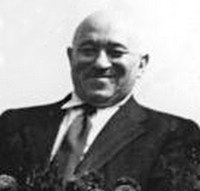Matyas Rakosi
Mátyás Rákosi was a Hungarian communist politician who ruled Communist Hungary from 1949 to 1956 . Rákosi was leader of Hungary’s Communist Party and a keen supporter of Joseph Stalin.
Born on 9 March 1892 in Ada, Mátyás Rákosi was the fourth son of a grocer. He served in the Austro-Hungarian army in World War One but was imprisoned in a prisoner-of war-camp after being captured on the Eastern Front. This experience radicalised Rákosi and after the war he soon joined the Hungarian Communist Party.
Rákosi played a part in the Hungarian Soviet Republic - a short-lived independent communist state established in Hungary in the aftermath of World War I. Rákosi was commander of the Republic’s Red Guard. The Hungarian Soviet Republic only lasted from 21 March until 1 August 1919. At its collapse, Rákosi fled to Ausztria before travelling to Communist Russia, where he knew Joseph Stalin would support him.
Tasked with restarting the Hungarian Communist Party, Rákosi secretly returned to Hungary in 1925. This proved very difficult: after the fall of the Hungarian Soviet Republic, the Hungarian Communist Party had become an underground movement. The party had to operate clandestinely, so it was a challenge to spread the word was challenging.

In 1927, Rákosi was arrested and imprisoned for eight years. This prison term was later made into a life sentence. However, he was released to the Soviet Union in 1940, in exchange for the Hungarian revolutionary banners captured by the Russian troops at Világos in 1849. Once back in Moscow, Rákosi was made leader of the Comintern (Communist International).
By the end of the Second World War, Eastern Europe was under the Red Army’s control. Moscow- approved leaders (such as Rákosi, who was a hard-line Stalinist) were imposed on the USSR’s satellite states in Eastern Europe. In 1945 Rákosi became General Secretary of the Hungarian Communist Party. From 1945-1949 Rákosi was deputy prime minister, with a spell as acting Prime Minister from February 1946 to May 1947.
By 1947, Rákosi had disposed of democratic rule. Opposition parties were forced away and intellectuals purged. He used “slice off’ tactics to remove anyone he deemed untrustworthy and “salami tactics” to remove factions that showed any disloyalty towards Moscow.
While he held power, Rákosi used the secret police (the AVO) to hunt out opponents. Historians have estimated that 2,000 Hungarians were executed and another 100,000 sent to prison while he led the government. Rákosi’s unwillingness to dilute the AVO’s power was one of the reasons for the 1956 Hungarian Uprising.
Rákosi was the most powerful man in Hungary while Stalin was alive. In 1952 he became Prime Minister on top of his role as General Secretary of the Hungarian Communist Party.
Stalin’s death in 1953 reduced his influence. In June 1953, Imre Nagy became premier, though Rákosi remained General Secretary. Nagy was dismissed in 1955, opening up a space for Rákosi to re-assert Stalinist policies. However, in June 1956 Rákosi finally lost his position as General Secretary. Publicly he ‘retired’, but, in reality, he was forced out by the Soviet Politburo. He went to live in the Kirghiz Soviet Socialist Republic.
In October 1956, the Hungarian Uprising erupted, startling Moscow. A group of Hungarian revolutionary students formulated the ‘Sixteen Points’(a list of demands) on 22 October 1956. One demand was that Rákosi be brought back to Hungary and be tried by a people’s tribunal.
Mátyás Rákosi had failed to grasp the full extent of Hungary’s anger towards Soviet authority. He had been adamant that he knew what was best for the country, but this view was no shared among the majority of Hungarians. At the end of the Uprising, Janos Kádár became the head of the Budapest government. Rákosi was deeply insulted in 1962 when he was expelled from the Communist Party: the organisation that he had supported for decades.
Mátyás Rákosi died on 5 February 1971 at the age of 78.
MLA Citation/Reference
"Matyas Rakosi". HistoryLearning.com. 2026. Web.
Key facts
| Name: | Mátyás Rákosi |
| Birth Date: | 9 March 1892, Ada, Bács-Bodrog County, Kingdom of Hungary, Austria-Hungary |
| Death: | 5 February 1971 (aged 78), Gorky, Russian SFSR, Soviet Union |
| Spouse: | Fenia Kornilova |
| Political affiliations |
Hungarian Communist Party
Hungarian Working People's Party |
| Appointments: |
Chairman of the Council of Ministers of the People’s Republic of Hungary
August 1952-Jul 19 |
